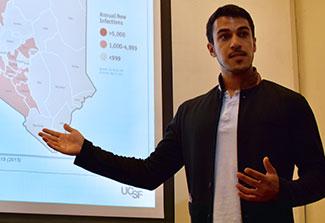ICRC Fellow Treating Mind and Body - Jennifer Velloza, UW Magnuson Scholar.
Jennifer Velloza spent a year crisscrossing the grass-covered plains and sloping hills of rural Swaziland, dividing her time among ten medical clinics in this small southern African country. Here, nearly one in four people have HIV — and that rate is even higher among women.
As a study manager for Doctors Without Borders, Velloza saw many pregnant and postpartum women struggle to get the HIV testing and treatment they needed, because they were also suffering from sexual trauma, depression or anxiety.



